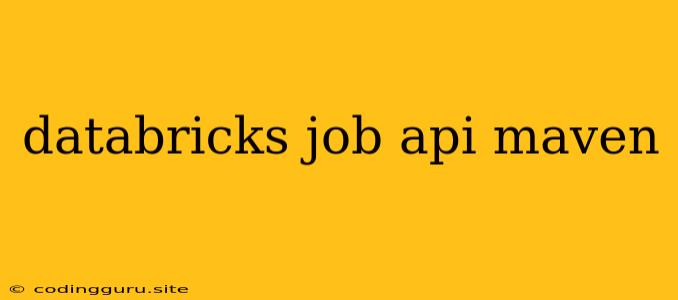Managing Databricks Jobs Effortlessly with the Databricks Job API and Maven
Databricks is a powerful platform for data engineering and machine learning, offering a seamless experience for managing and running your jobs. While the Databricks UI provides a user-friendly interface for job creation and monitoring, leveraging the Databricks Job API and integrating it with your existing build process using Maven unlocks significant efficiency and automation benefits.
What is the Databricks Job API?
The Databricks Job API is a powerful set of REST APIs that allow you to programmatically interact with Databricks jobs. This means you can create, update, run, and manage your Databricks jobs directly from your code, eliminating the need for manual interaction within the Databricks UI.
Why Use Maven with the Databricks Job API?
Maven, a popular build automation tool, provides a robust framework for managing your project's dependencies, building, and deploying your applications. By integrating Maven with the Databricks Job API, you gain several advantages:
- Automated Job Creation: Automate the creation and configuration of Databricks jobs as part of your build process, ensuring consistency and eliminating manual errors.
- Version Control: Track changes to your jobs within your version control system, enabling collaboration, rollbacks, and easy auditing.
- Dependency Management: Leverage Maven's dependency management features to ensure your Databricks jobs utilize the correct libraries and versions.
- Continuous Integration and Deployment (CI/CD): Seamlessly integrate your Databricks jobs into your existing CI/CD pipeline, enabling automated testing, deployment, and updates.
Setting Up Your Project with Maven and the Databricks Job API
-
Project Setup: Create a new Maven project and add the necessary dependencies for interacting with the Databricks Job API. You can find the required dependencies in the Databricks documentation.
-
Authentication: Configure your project to authenticate with Databricks. You can use API token authentication or service principal authentication for secure access.
-
Job Definition: Define your Databricks jobs in your Maven project using configuration files or code. This includes specifying job parameters, cluster settings, and other essential details.
-
Job Management: Create Maven targets to interact with the Databricks Job API. This allows you to create, update, run, and manage your Databricks jobs directly from your Maven build process.
Example Maven Code for Databricks Job Management
// Sample code to submit a Databricks job using the Databricks Job API
// You will need to replace the placeholders with your actual credentials and job settings.
public class DatabricksJobSubmitter {
public static void main(String[] args) {
// Replace with your Databricks instance URL
String databricksUrl = "https://.cloud.databricks.com";
// Replace with your Databricks token
String databricksToken = "";
// Create a new Databricks client
DatabricksClient client = new DatabricksClient(databricksUrl, databricksToken);
// Define your job parameters
Map jobParams = new HashMap<>();
jobParams.put("input_path", "s3://your-bucket/input.csv");
// Define the job settings
JobSettings jobSettings = new JobSettings()
.setJobName("My Databricks Job")
.setExistingClusterId("")
.setLibraries(List.of(new Library("maven", "com.example", "my-library", "1.0.0")))
.setJobParameters(jobParams);
// Submit the job
JobRun jobRun = client.submitJob(jobSettings);
// Print the job run ID
System.out.println("Job run ID: " + jobRun.getRunId());
}
}
Benefits of Using Maven and the Databricks Job API
- Increased Efficiency: Automate job management, reducing manual effort and time spent on repetitive tasks.
- Improved Code Quality: Leverage Maven's dependency management and build process to ensure consistency and avoid errors.
- Enhanced Collaboration: Manage jobs within your version control system, allowing for better collaboration and code sharing.
- Enhanced Scalability: Easily scale your job management processes as your project grows.
Conclusion
By integrating the Databricks Job API with Maven, you can streamline your Databricks job management processes, enhance efficiency, and improve your overall development workflow. This integration allows for a more efficient and reliable way to build, manage, and deploy your Databricks jobs. Remember to consult the Databricks documentation for detailed instructions and specific API calls.
